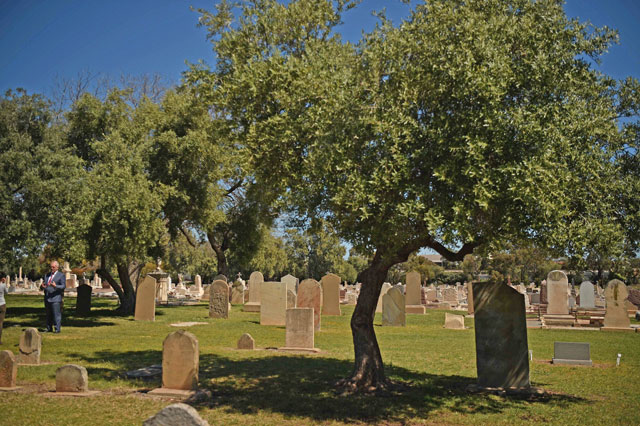ADELAIDE, Australia — From the graveside to the dinner plate, olive oil is being harvested from centuries-old trees at a Australian cemetery in a bid to shake up people’s attitudes towards death and burial sites.
The full-bodied oil from Adelaide city’s West Terrace Cemetery is the latest effort by Australian authorities to attract not just the dead — but also the living — to the historic sites.
By reinventing cemeteries as unexplored, lush, green spaces in the heart of crowded cities, they hope to challenge the taboos surrounding death while breathing new life into the usually sombre grounds.
“Trying to sell death is very hard, no-one wants to buy it,” Adelaide Cemeteries Authority Chief Executive Robert Pitt told AFP as olive trees rustled in the background above ageing headstones.
“However, if we’re selling olive oil or selling an experience... [it’s] where the real value of coming to a cemetery is. And there’s definitely a sense of place here. There’s a sense of reverence and a sense of history.”
This year’s limited-edition bottles of olive oil, released to mark the cemetery’s 180th anniversary, sold out in a flash despite their unusual source.
It shows that cemeteries are moving beyond their main role as sites “for the disposal of the dead”, said historian Cathy Dunn.
Older cemeteries such as West Terrace and Sydney’s Rookwood — the largest in the southern hemisphere — are also becoming tourist hotspots, she added.
Rookwood, a so-called “necropolis” that is the final resting place for more than one million people, has drawn crowds by hosting open days, annual sculpture walks and even bike races.
Its recent open day to commemorate 150 years featured live jazz music, grave-digging demonstrations and face-painting for children.
Rookwood Chief Executive George Simpson told AFP the industry was tapping into online genealogy to connect with as many people as possible.
In Adelaide, Pitt is considering offering augmented reality at cemeteries to bring grave sites to life with messages from the deceased.
Facing mortality
There’s another pressing need for cemeteries to play a bigger part in people’s lives — death rates in Australia are set to more than double over the next few decades as the population ages.
“More and more people are going to be confronted by their own mortality, if not those of relatives and friends,” said Pitt.
His cemeteries authority has organised “Death Over Dinner” events — where guests share a meal and ask expert speakers about the end of life — to normalise discussions around dying.
“Our experience as cemetery operators and funeral coordinators is very much around that people who pre-plan... and think about their end of life before the time comes have a better outcome for the people left behind,” he added.
Not everyone is comfortable with the idea of cemeteries hosting entertainment. Media reports earlier this year highlighted the complaints of a Melbourne family upset after their grandmother’s funeral was delayed as it clashed with a historic food tour.
But Maree Edwards, who has witnessed the evolution of Rookwood since burying her father there four decades ago, is convinced the spruced-up grounds and changing attitudes towards death will open up the hidden world to more people.
“Twenty years ago, there was only a little, tiny tin-shed flower seller here at the entrance. But now, there’s coffee shops,” she said, adding that she hopes her daughter will one day join her for a weekend sojourn at Rookwood.
“You’ve got to come with a different mentality here and think, ‘Wow, this isn’t like a creepy, dead man’s land. It’s nice, it’s a cheery place.’”
“And it’s just a joy to be here, bizarre as it seems.”
